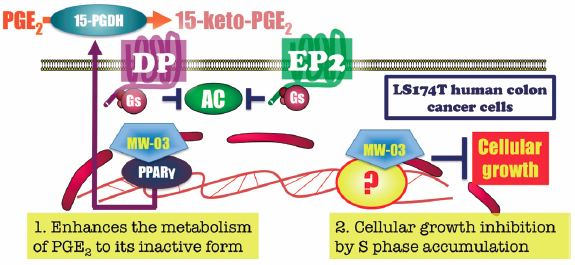- 著者
- Hiroyuki Nakamura Toshihiko Murayama
- 出版者
- The Japanese Pharmacological Society
- 雑誌
- Journal of Pharmacological Sciences (ISSN:13478613)
- 巻号頁・発行日
- vol.124, no.3, pp.307-312, 2014-03-20 (Released:2014-03-18)
- 参考文献数
- 30
- 被引用文献数
- 27 37
The arachidonic acid (AA) cascade is regulated mainly by the actions of two rate-limiting enzymes, phospholipase A2 (PLA2) and inducible cyclooxygenase-2 (COX-2). PLA2 acts to generate AA, which serves as the precursor substrate for COX-2 in the metabolic pathway leading to prostaglandin production. Amongst more than 30 members of the PLA2 family, cytosolic PLA2α (cPLA2α, group IVA) plays a major role in releasing AA from cellular membranes. Sphingolipids are a novel class of bioactive lipids that play key roles in the regulation of several cellular processes including growth, differentiation, inflammatory responses, and apoptosis. Recent studies implicated a regulatory function of sphingolipids in prostaglandin production. Whereas ceramide-1-phosphate and lactosylceramide activate cPLA2α directly, sphingosine-1-phosphate induces COX-2 expression. Sphingomyelin has been shown to inhibit the activity of cPLA2α. In addition, several sphingolipid analogs including a therapeutic agent currently used clinically are also reported to be inhibitors of cPLA2α. This review explores the role of sphingolipids in the regulation of cPLA2α and COX-2.
- 著者
- Naofumi Seira Naoki Yanagisawa Akiko Suganami Takuya Honda Makiko Wasai John W. Regan Keijo Fukushima Naoto Yamaguchi Yutaka Tamura Takayoshi Arai Toshihiko Murayama Hiromichi Fujino
- 出版者
- The Pharmaceutical Society of Japan
- 雑誌
- Biological and Pharmaceutical Bulletin (ISSN:09186158)
- 巻号頁・発行日
- vol.40, no.10, pp.1806-1812, 2017-10-01 (Released:2017-10-01)
- 参考文献数
- 31
- 被引用文献数
- 3
Increases in the expression of prostaglandin E2 (PGE2) are widely known to be involved in aberrant growth in the early stage of colon cancer development. We herein demonstrated that the novel indole compound MW-03 reduced PGE2-induced cAMP formation by catalization to an inactive metabolite by inducing 15-hydroxyprostaglandin dehydrogenase through the activation of peroxisome proliferator-activated receptor-γ. MW-03 also inhibited colon cancer cell growth by arresting the cell cycle at the S phase. Although the target of MW-03 for cell cycle inhibition has not yet been identified, these dual anti-cancer effects of MW-03 itself and/or its leading compound(s) on colon cancer cells may reduce colon cancer development and, thus, have potential as a novel treatment for the early stage of this disease.
